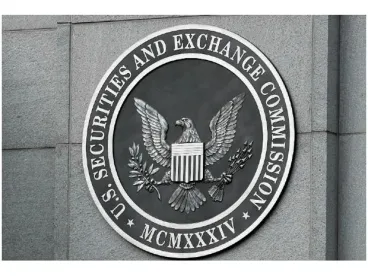The U.S. Securities and Exchange Commission (SEC) has an Appointments Clause problem. Actually, it has two. Currently, the Commission’s ability to make decisions is limited in two ways: (1) as of last Friday, there are now only two sitting Commissioners, including no SEC Chairperson, rather than the full complement of five; and (2) a recent federal appellate court decision declaring the SEC’s process of hiring administrative law judges (ALJs) unconstitutional, thus casting doubt on the many activities those judges perform. Until these can be resolved, the agency’s ability to function generally, and in particular its ability to act as an enforcement agency, may be compromised.
The Appointments Clause of the Constitution states:
[The President] shall nominate, and by and with the Advice and Consent of the Senate, shall appoint Ambassadors, other public Ministers and Consuls, Judges of the Supreme Court, and all other Officers of the United States, whose Appointments are not herein otherwise provided for, and which shall be established by Law: but the Congress may by Law vest the Appointment of such inferior Officers, as they think proper, in the President alone, in the Courts of Law, or in the Heads of Departments.
Each of the SEC’s five Commissioners must be nominated by the President and approved by the Senate. With Chair Mary Jo White’s departure on Friday, the SEC now has only two sitting Commissioners – Michael Piwowar, a Republican, and Kara Stein, a Democrat. President Trump has nominated Jay Clayton, an attorney from Sullivan & Cromwell, to be the new SEC Chair. However, as of now, no confirmation hearings have been set by the Senate and various Democratic Senators have stated that they will oppose Mr. Clayton’s nomination. More importantly, perhaps, the White House has not floated names for the other two positions, which, by regulation, will be one Democrat and one Republican.
So, now the two remaining Commissioners must do the work of five. The Commission does not actually lack a quorum because it is three Commissioners down though. According to 17 C.F.R. §200.41, a quorum can be three; but it can be whatever number of Commissioners there are if there are less than three Commissioners. So, as of now, two makes a quorum. But the two must act in unison to get anything done, and that has not always been their track record. Even if Mr. Clayton gets confirmed relatively soon, the likelihood of conflicts, given his decades representing certain financial institutions and the likelihood that he may recuse himself at least in some instances involving his former clients, again leads back to the likelihood that two Commissioners of different parties may be left acting for the entire SEC. Particularly since the Commission has not finished enacting all the regulations required by Dodd-Frank, continuing to operate with less than a full bench will remain a problem for the foreseeable future.
The Constitutionality of The SEC’s ALJs
The current dearth of Commissioners is amplified by the agency’s other Appointments Clause issue. A few weeks ago, the U.S. Court of Appeals for the Tenth Circuit created a clear circuit split with the U.S. Court of Appeals for the D.C. Circuit over an issue that has been percolating through the federal courts for several years without clear resolution: whether the SEC’s ALJs were “inferior officers” that needed to be appointed pursuant to the Constitution’s Appointments Clause. There is no doubt that the SEC’s five ALJs are not treated as “inferior officers” that are appointed pursuant to the Appointments Clause, which would require them to be appointed by the President, a court of law, or the head of a department, which may or may not include the SEC. Instead, they are hired through the government’s civil service process overseen by the Office of Personnel Management just like other federal government employees.
Respondents in SEC administrative enforcement actions before ALJs in recent years have taken to challenging the authority of these ALJs to preside over their hearings. Respondents have done this both within the administrative proceedings themselves and, more often, directly in federal court seeking to enjoin the proceedings as violating the Appointments Clause. To date, no appellate court has permitted a respondent to circumnavigate the ALJ process by enjoining the proceedings. Instead, any appellate court to have faced the issue has concluded that the respondent must first raise its constitutional challenge in the administrative forum – before the very ALJ whose authority is being questioned – and then appeal the result after the ALJ process concludes.
Respondents in two SEC ALJ proceedings have now done just that and the appellate courts have reached diametrically opposite conclusions. First, the D.C. Circuit, as we discussed in a prior post, in Raymond J. Lucia Companies, Inc. v. SEC, concluded that SEC ALJs need not be appointed pursuant to the Appointments Clause because they were simply employees rather than “inferior officers.” The D.C. Circuit relied heavily on its own prior precedent in reaching this conclusion, which provided that the distinction between employees and “inferior officers” depended on three factors:
1. the significance of the matters resolved by the official;
2. the discretion the official exercised in reaching his or her decisions; and
3. the finality of those decisions.
In particular, the court concluded that SEC ALJs were not “inferior officers” because they did not render final decisions on behalf of the Commission. Lucia has sought rehearing en banc by the D.C. Circuit. That petition remains pending.
The U.S. Court of Appeals for the Tenth Circuit, in a 2-1 decision, took entirely the opposite approach last month in Bandimere v. SEC. Not constrained by (and even somewhat skeptical of) the D.C. Circuit’s Appointments Clause analysis, the Bandimere court concluded that an SEC ALJ was an “inferior officer” who must be appointed consistent with the Appointments Clause. In doing so, the court relied heavily on Freytag v. Comm’r of Internal Revenue, in which the Supreme Court concluded that inferior officers were those:
1. whose positions were “established by law”;
2. whose duties, salary and means of appointment were specified by statute; and
3. who exercised significant discretion in carrying out important functions.
Using those criteria, the Tenth Circuit majority had little trouble concluding that SEC ALJs were “inferior officers.”
The court began its analysis by focusing on the Administrative Procedures Act (APA), which authorizes ALJs to preside over and take evidence at administrative hearings. See 5 U.S.C. §§556(b), 3105. According to APA and SEC regulations, the SEC has delegated many of its functions to ALJs, including the authority to administer oaths, determine the scope and form of evidence, subpoena parties, examine witnesses, prepare initial decisions with factual findings and legal conclusions, and rule on both dispositive and procedural motions. And the Tenth Circuit said that these responsibilities made clear that, regardless of whether ALJs made final decisions on behalf of the Commission, they exercised significant discretion and carried out important functions.
Unlike the Lucia court, which emphasized the Commisison’s ability to review an ALJ’s initial decision de novo, the Bandimere court focused on the fact that in 90 percent of cases, the Commission did not do so and instead allowed an ALJ’s initial decision to become final without plenary review.
The Bandimere decision has potentially far-reaching implications for other administrative agencies, as the dissenting judge explained, because the Tenth Circuit based its decision principally on the APA’s delineation of an ALJ’s responsibilities – which may well be interpreted similarly for ALJs from other administrative agencies who are hired via the civil service process. According to the dissent, the Bandimere majority’s rationale could mean that the hiring of some 1,792 federal ALJs violated the Appointments Clause. In the majority’s view, however, the ramifications of its decision on other agencies, with ALJs with potentially very different authority, was not before the court and could be ignored for another day.
Like the losing party in Lucia, the SEC in Bandimere will likely seek rehearing en banc. Both of these cases will probably then make their way to the Supreme Court for potential review.
The decisions in Bandimere and Lucia leave the SEC, particularly now, somewhat between a rock and a hard place. If the D.C. Circuit’s view of ALJs prevails, it is up to the SEC, with its depleted Commissioner ranks, to actually make “final decisions” on behalf of the agency. If that review by the Commissioners is to be taken seriously, the two current Commissioners may have little time for anything else. On the other hand, if the Tenth Circuit’s view of ALJs is correct, it would seem that Commissioners would then have to add hiring ALJs to their already long list of responsibilities.
Either way, the Commissioners’ responsibilities may have expanded. And with the continued progress of H.R. 78, the SEC Regulatory Accountability Act, through Congress, which imposes additional cost-benefit and other analyses on the Commission when enacting new regulations (and requires similar analysis of existing regulations), the agency and its Commissioners are likely to have their hands full for the foreseeable future.




 />i
/>i

